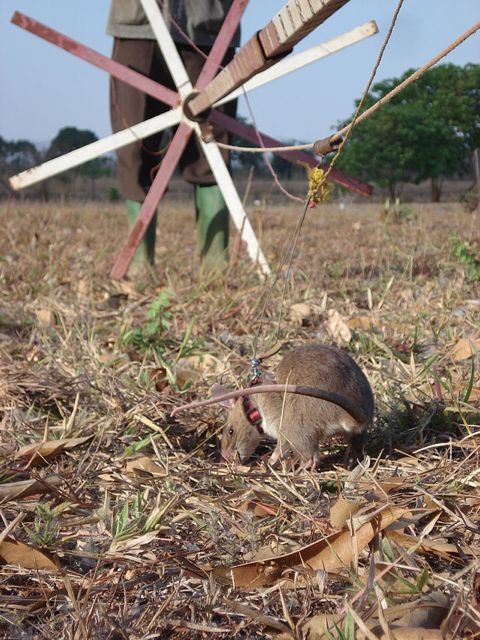Tanzania-based NGO (Non-Government Organization) APOPO trains giant African pouched rats to sniff out land mines and tuberculosis – two issues that have had a very negative impact on the entire continent of Africa. APOPO stands for “Anti-Persoonsmijnen Ontmijnende Product Ontwikkeling” which, in English, translates to “Anti-Personnel Landmines Detection Product Development.” Despite the animals’ reputation for thieving and spreading disease, APOPO has shown that rats can be as helpful as people: the rats trained by APOPO have saved thousands of lives across Africa.
Training one of these giant rats takes anywhere from nine months to a year. Once trained, a single rat can clear a 200 square foot area ridden with landmines in an hour (if done manually, the same area would take 50 hours to clear). A rat trained to sniff out tuberculosis can evaluate 50 samples in as little as eight minutes (a job that would take almost a day’s work for a lab technician). Although it is difficult to estimate, around 18,000 fatalities have resulted from landmines and explosive remnants of war (EWR) in the African Union between 1999 and 2013. Many of the landmines in Mozambique were almost all left over from a civil war that ended in 1992. Since then, APOPO has cleared the country of 6,693 landmines, 29,934 small arms and ammunition, and 1,087 bombs. Members of APOPO say that Mozambique is on track to be completely free of landmines by the end of 2014.
In 2005, the World Health Organization declared tuberculosis a crisis in Africa. The rats trained to identify tuberculosis have analyzed over 260,000 samples from health clinics in Dar es Salaam, Tanzania and Maputo, Mozambique. Before the rats, traditional methods for testing tuberculosis were not very reliable in the African environment.
The early stages of training for the mine and tuberculosis detection rats are similar. When the rats are babies, they are socialized to work with and be handled by people. The rats are then conditioned with clicker training. The clicker training allowed the rats to associate the sound of a click with a reward (usually peanuts or bananas). The rats are then introduced to a target scent, which is either TNT or a tuberculosis positive sample. The advantage of using rodents is that they are cheap to train, cheap to obtain, and are very plentiful in Africa. After all costs are accounted for, each APOPO rat costs about 7,600 dollars, whereas a dog being trained for the same jobs as a rat can cost three times as much. Rats also have the advantage of being too lightweight to trip off a mine when they are examining a field. The APOPO program has made great progress in the clearing of stray landmines and will continue to have a positive impact on Africa.
Source:
